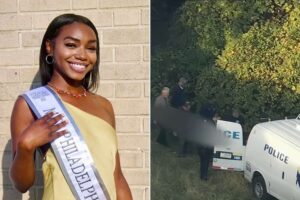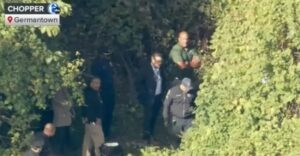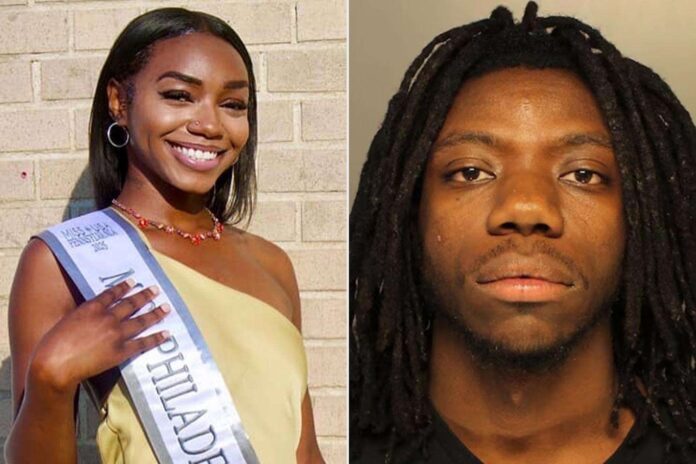In a heartrending pilgrimage, Tanya and Kevin Scott, parents of slain 23-year-old Kada Scott, returned this week to the Philadelphia Civic Center, the last place their daughter was seen alive before her tragic disappearance on October 4. Stepping into the backstage dressing room where Kada prepared for the Miss Philadelphia Rising Star pageant, they were confronted by an untouched relic of her final moments: her shimmering emerald gown, still hanging on a rack, its sequins catching the dim glow of a single flickering light. Tanya, overcome with grief, clutched the fabric and whispered, “I can still smell her perfume—Chanel No. 5. It’s like she’s here.” That light, inexplicably pulsing on and off, has not been touched since her vanishing, a quiet vigil kept by staff who say it feels wrong to extinguish it.

The Civic Center, a glass-and-steel monument to the city’s cultural pride, hosted the pageant as a celebration of young talent, with Kada—a nursing assistant and Penn State student—competing for a $5,000 scholarship to fund her dream of becoming a pediatric nurse. Known for her radiant smile and a poise that belied her nerves, Kada had captivated the audience during her preliminary walk, her gown trailing like liquid jade. “She was electric,” recalled pageant director Marissa Tate, who choked back tears recounting Kada’s final bow at 8:45 p.m. “She hugged everyone backstage, said she’d see us for finals. Then she stepped out to take a call—and never came back.”
That call, now a focal point of the Philadelphia Police Department’s homicide investigation, came from a burner phone linked to 21-year-old Keon King, the prime suspect charged with Kada’s kidnapping and murder. Court documents reveal King’s relentless texts and calls—17 in the hour before her exit—pressuring her to meet in the employee parking lot. Surveillance footage captures her pacing near her mother’s silver Hyundai Elantra, phone to ear, before a dark SUV—King’s stolen Hyundai Accent—pulls up at 9:02 p.m. She climbs in, and the vehicle vanishes into the night. Her car, left behind, held only her pageant sash and a half-empty water bottle, while her iPhone, Apple Watch, and iPad went dark, their last pings tracing a chilling path to a shallow grave behind Ada H.H. Lewis Middle School.
The Scotts’ return to the venue, escorted by detectives and a grief counselor from Bethel AME Church, was both a quest for closure and a wrenching step in retracing Kada’s final hours. Tanya, a school aide whose soft-spoken demeanor masks a steely resolve, described the dressing room as a time capsule. “Her makeup brushes were still on the counter, mascara open like she’d be back to touch up,” she said, her voice breaking. “That perfume—it’s her signature. I sprayed it on my wrist just to feel her close.” Kevin, a mechanic who has led daily vigils outside the 15th Precinct, stood silently by the gown, his hands tracing the hem. “This was her moment,” he said. “She worked so hard. And someone stole it.”
The flickering light, a fluorescent bulb in a corner sconce, has become an unofficial shrine. Civic Center staff, interviewed anonymously, say it began stuttering the night Kada disappeared, though maintenance found no faulty wiring. “It’s her,” whispered a janitor who requested anonymity, citing the venue’s no-comment policy during the investigation. “No one’s touched it. We can’t bring ourselves to.” Superstition or sentiment, the light’s erratic pulse mirrors the city’s collective grief—a beacon refusing to fade, much like the Scotts’ fight for justice.

This visit comes amid cascading forensic breakthroughs in the case. GPS data from Kada’s iPhone, revealed yesterday, showed a 3-minute detour through an unmarked service road off Awbury Road, where her car paused for 46 seconds at 10:24 p.m.—no calls, no texts, just silence. Earlier, gas station footage captured King’s SUV beside her Elantra, brake lights flashing twice in a coded signal. These clues tighten the noose around King, whose prior kidnapping charge (dropped, then refiled) and a TikTok video of him stalking another woman paint a predator’s portrait. Yet, whispers of accomplices—a third phone pinging the detour, a torched gold Toyota Camry—keep investigators scrambling. “We’re peeling back layers,” Deputy Commissioner Frank Vanore said Wednesday. “The pageant was the lure; the road was the trap.”
For the Scotts, the Civic Center is hallowed ground laced with pain. Tanya described Kada’s pageant prep: months of saving for the $800 gown, practicing her speech on healthcare equity, and choosing Chanel No. 5 “because it made her feel unstoppable.” The family had cheered from the third row, Tanya snapping photos as Kada twirled. “She was going to use that scholarship to change lives,” Kevin added, his voice raw. “Now we’re here, touching what’s left.” Their visit, coordinated with DA Larry Krasner’s office, aimed to collect Kada’s belongings for evidence—fibers from the gown may match traces in King’s burned Accent—but turned into a cathartic reckoning.
The community’s response has been visceral. A GoFundMe for Kada’s memorial and reward fund has surged past $80,000, fueled by strangers moved by her story. Monday’s vigil at the Civic Center drew 400, with candles encircling a poster of Kada in her gown, her smile frozen in time. City Councilwoman Kendra Brooks, present with clergy, called for systemic change: “Our daughters deserve safety, not pageants turned to crime scenes.” Social media hums with #JusticeForKada, while X posts amplify the flickering light’s eerie lore, some claiming it blinks in patterns—two pulses, like the brake lights in the gas station clip.

Investigators, meanwhile, are cross-referencing pageant footage with witness tips. A volunteer usher reported seeing a man matching King’s description—hoodie, lanky frame—lingering near the backstage exit at 8:50 p.m., unnoticed amid the chaos of costume changes. Cell tower dumps confirm King’s burner phone circling the venue from 7 p.m., pinging every 10 minutes. “He was hunting,” Assistant DA Ashley Toczylowski told a closed hearing, per leaked transcripts. The gown, now in evidence, may yield DNA; its hem, slightly torn, suggests a struggle. Tanya, however, clings to its scent: “It’s her essence. I won’t let them bag it up yet.”
Philadelphia, a city scarred by 300 homicides this year, feels Kada’s loss as a collective wound. The Civic Center, once a stage for dreams, now hosts grief circles led by Germantown pastors. Women’s safety apps trend on local X feeds, with users sharing AirTag hacks and night-walking buddies. Penn State’s “Kada’s Light” group pushes for campus escorts, citing her 9 p.m. shift start as a vulnerability. True-crime podcasters, dissecting the GPS detour and brake-light signals, call this a “tech tragedy”—digital breadcrumbs mapping a killer’s steps but failing to save a life.
As the Scotts left the venue, Tanya paused at the flickering light, placing a rose beneath it. “Keep shining, baby,” she whispered. Kevin, eyes red, vowed to return until King’s trial: “This gown, this light—they’re her voice now.” The investigation churns—FBI profilers model accomplice theories, divers search arboretum ponds for Kada’s devices—but the dressing room remains sacred. Staff refuse to rebook the space; the light stays on. Tips flood the hotline (215-686-3353), with 420 since Tuesday, one claiming a second SUV trailed King’s. For now, Kada’s perfume lingers, a fragile thread tying her parents to a daughter stolen too soon.
